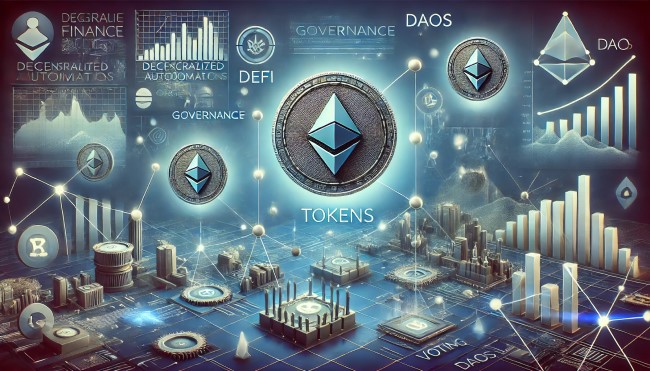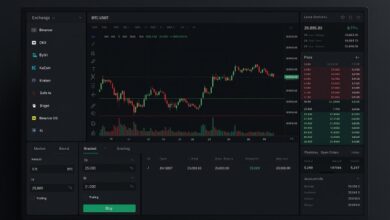The Economic Implications of Governance Tokens

Governance tokens are digital assets that grant holders voting rights within a blockchain ecosystem, particularly in decentralized finance (DeFi) and decentralized autonomous organizations (DAOs). As the crypto landscape evolves, governance tokens have emerged as a crucial mechanism for decentralized decision-making, enabling users to influence protocol development, resource allocation, and governance processes. Understanding governance tokens is vital for grasping their economic implications in shaping the future of blockchain ecosystems. Visit the site if you are looking for a reliable trading platform online.
The Role of Governance Tokens in Decentralized Autonomous Organizations (DAOs)
DAOs are entities governed by smart contracts, allowing decentralized decision-making. Governance tokens serve as the lifeblood of DAOs, providing holders with the power to propose, discuss, and vote on critical decisions. For instance, MakerDAO uses its governance token, MKR, to facilitate decisions regarding collateral types, interest rates, and risk parameters. This structure enhances community involvement and aligns incentives, ensuring that token holders actively participate in shaping the platform’s future.
The decentralized nature of DAOs minimizes centralization risks and enhances transparency. Token holders can directly influence the organization’s trajectory, fostering a sense of ownership and accountability. The case of Compound exemplifies this, where holders of the COMP token can propose and vote on changes to the protocol, including updates to interest rates and governance mechanisms.
Economic Incentives and Tokenomics
Tokenomics, the study of the economic aspects of tokens, is crucial in understanding the value and utility of governance tokens. These tokens create economic incentives for holders, such as voting power, rewards, and staking opportunities. For instance, token holders may receive additional rewards for participating in governance activities, creating a direct link between engagement and financial benefit.
The supply and demand dynamics of governance tokens significantly impact their market value. If a governance token becomes highly sought after for its voting rights or rewards, its price may increase, benefiting early adopters and active participants. However, the volatility inherent in cryptocurrency markets can also lead to significant price fluctuations, raising concerns about the long-term stability of governance token economies.
Governance Tokens and Market Dynamics
Governance tokens influence market dynamics by affecting the behavior of investors and traders. The decisions made by token holders can directly impact the value of the underlying assets and the health of the ecosystem. For instance, if a DAO votes to implement a new feature or change the governance structure, it can lead to increased adoption and investment, positively affecting the token’s price.
Furthermore, governance tokens can enhance price discovery mechanisms within decentralized markets. By allowing token holders to vote on parameters such as liquidity provision and reward distributions, these tokens help create a more efficient market environment. As a result, the economic implications of governance tokens extend beyond individual projects, influencing broader market trends and investment strategies.
Risks and Challenges Associated with Governance Tokens
Despite their potential benefits, governance tokens are not without risks. One significant concern is the possibility of centralization, where a small number of holders possess disproportionate voting power. This can lead to governance attacks, where a group of coordinated individuals can manipulate decisions to their advantage, undermining the democratic principles that governance tokens aim to uphold.
Historical examples, such as the governance issues faced by the DAO project in 2016, illustrate the potential consequences of governance failures. The project suffered a hack due to vulnerabilities in its smart contract, leading to significant financial losses and a loss of trust among participants. These events highlight the necessity for robust governance frameworks and mechanisms to safeguard against exploitation.
Mitigating these risks involves developing inclusive governance models that encourage widespread participation and implementing mechanisms to prevent malicious activities. Effective communication and transparency within the community are also vital to ensure that all stakeholders feel empowered to contribute to governance decisions.
Regulatory Perspectives on Governance Tokens
The regulatory landscape surrounding governance tokens is complex and continually evolving. Many jurisdictions are grappling with how to classify governance tokens, leading to uncertainty about their legal status. For instance, in the United States, regulatory bodies like the SEC have scrutinized governance tokens, often categorizing them as securities. This classification would subject them to stringent regulations, impacting their trading and utility.
The implications of regulation on governance token markets are profound. If governance tokens are deemed securities, projects may face increased compliance costs and reduced market access. This could hinder innovation and participation in decentralized governance models, ultimately impacting the economic dynamics of blockchain ecosystems.
Looking ahead, the potential for regulatory clarity is promising. As governments recognize the importance of blockchain technology, we may see the emergence of tailored regulatory frameworks that encourage responsible innovation while protecting investors. This could foster a healthier environment for governance tokens and decentralized projects.
Future of Governance Tokens and Economic Models
The future of governance tokens is poised for growth and innovation. As blockchain technology matures, we may witness the development of more sophisticated economic models leveraging governance tokens. These models could enhance community engagement, drive sustainability, and improve the overall governance experience.
One potential avenue for innovation lies in creating hybrid models that combine traditional governance structures with decentralized principles. For instance, integrating features such as liquid democracy, where token holders can delegate their voting rights, could enhance participation and ensure that decisions reflect the community’s collective will.
Furthermore, the rise of new sectors, such as decentralized social media and gaming, could give birth to unique governance token ecosystems. These projects may adopt novel approaches to governance and economic incentives, reshaping traditional economic systems and fostering greater inclusivity.
Conclusion
Governance tokens play a critical role in shaping the future of blockchain ecosystems. By facilitating decentralized decision-making and aligning economic incentives, they empower communities to influence project development and resource allocation. However, understanding the economic implications of governance tokens requires a comprehensive examination of their role in DAOs, market dynamics, risks, and regulatory challenges.



